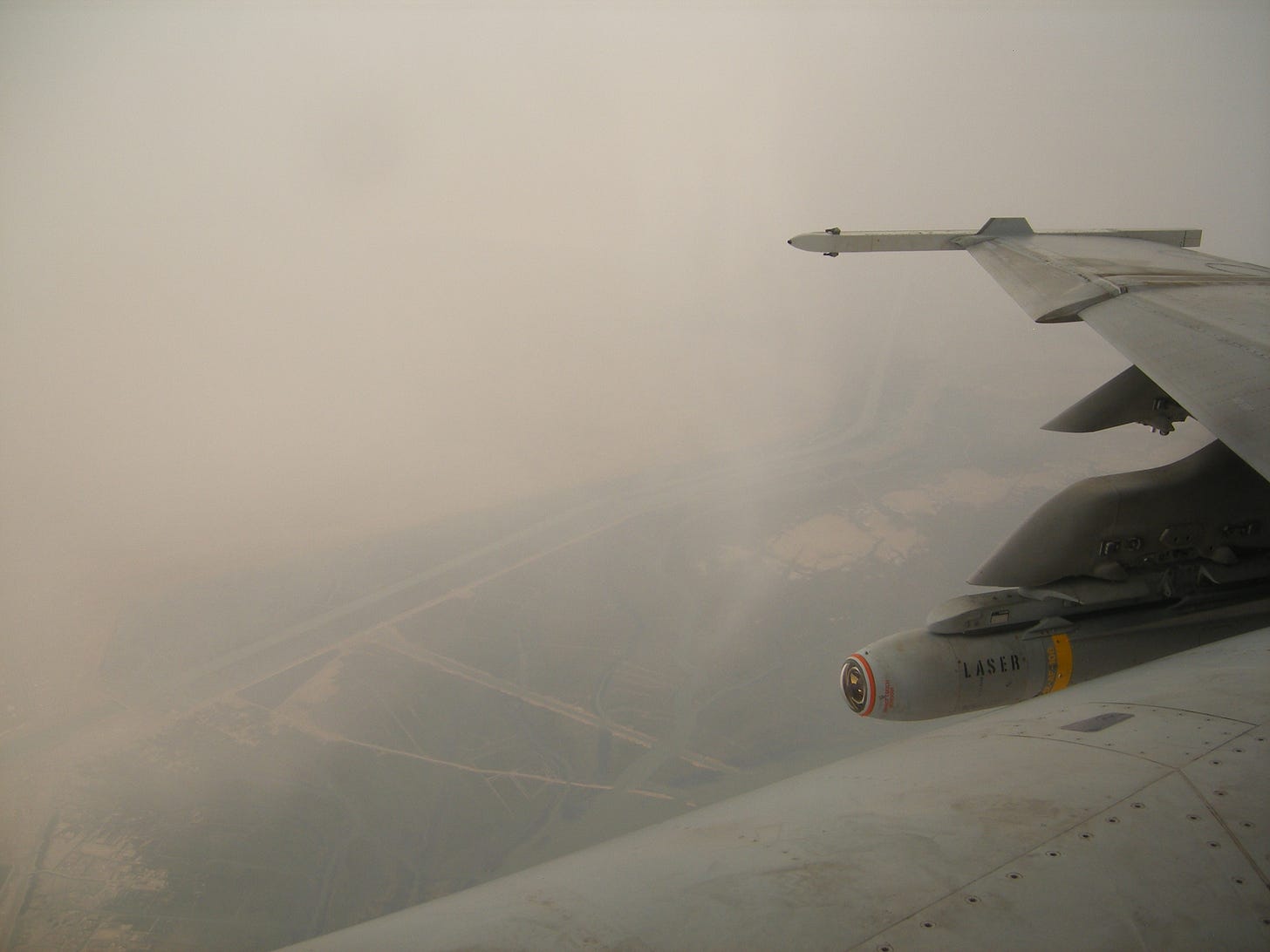Last flight over Basra!
Another heart racing tale of adventure! But also, what is Reality?!?
My last combat mission was in July 2007 over Basra. We were part of the final event for CVW-9 that deployment - three or four sections supporting ground operations in Iraq. Once we returned, the carrier battle group needed to jam east to the Pacific for an exercise off Guam.
After briefing, DCAG, the deputy air wing commander, walked into CVIC and told us in no uncertain terms that we were not under any circumstances to be late returning to the ship [1]. The whole battle group would start steaming east as soon as the last plane was recovered. He didn’t explicitly threaten us, threat was definitely implied. Do. Not. Be. Late.
I was mission commander for our two-ship supporting night ground operations in Basra. We launched and checked in with the controller, who reassigned us to a patrol that had been hit by an IED and taken casualties. They were waiting for Medevac and wanted overwatch support.
Once we switched over, it was clear they were having a bad day. Since insurgents were still in the area, I coordinated with their JTAC to conduct a show of force - coming in low and loud. The idea was to make insurgents think twice about doing more nefarious shit without resorting to actual force.
We did a series of passes, both jets making noise and firing off flares to look scary. Then we orbited overhead. And did more shows of force. And orbited overhead. For hours.
As we ran low on gas, I asked L-Ace [2], the WSO in dash two, to coordinate our tanker to come closer so we could maintain presence overhead. The USAF guys came through huge - they agreed to orbit directly overhead so we could yo-yo to top off with gas, one jet refueling while the other stayed overhead and maintained contact.
We did that for more hours while the clock ticked. Toward the end of our vulnerability window, I could see the Link 16 tracks from all the other CVW-9 jets returning to the ship. And I could hear DCAG’s voice in my head. Do. Not. Be. Late. But I didn’t want to leave the guys on the ground until the wounded were on the helo and they were back on the move.
So we stayed overhead. And here’s me the whole time thinking we’re going to hear about this. I didn’t think I’d lose my wings, but I definitely thought there would be consequences for making all those ships and all those guys who were much more important than me wait on us.
Finally, the wounded were off in the helo and the patrol was moving. The USAF guys came through again, offering to drag us all the way back to Mom [3] since we were low on gas.
We landed and I went down to CVIC for debrief, still in flight gear. Here comes CAG, the air wing commander, and I thought, here we go.
And nothing. I walked him through it. He said okay. And that was it. I debried CVIC and that was the end of it all. Nothing.
I’ve told this story in business contexts before about strategic decisions and uncertainty. About leaders having to make choices not only with imperfect information but sometimes even never being able to know if you did make the right choice. The most common reaction is that I must’ve made the right choice because I didn’t get in trouble.
But that’s not the point. It wasn’t possible to know what the right choice was. I made a choice. I could have left the guys on the ground and no one would have second-guessed it. But I would never have known if they’d be okay or if insurgents would have come back. I also don’t know if staying made any difference either way. I made a choice in the moment and will never know if I should have done better.
That was the moral of the story for a long time.
But, kind of hilarious. Recently, I met up with the guy I was flying with that night. He flies for Delta now. We were catching up and talking about old times and I mentioned this story.
He doesn’t even remember the flight. He swears up and down it wasn’t him because he doesn’t remember it at all.
For him, it was such a routine flight it wasn’t even worth remembering. For me, it was an existential moment about choices and trying your best to do the right thing under uncertainty.
So the second moral of the story is: What is Reality? Are we all just living in action movies in our own heads? I don’t even know at this point.
[1] They used to say that the cost of keeping a carrier battle group at sea was $1M per day. No idea if that is actually true, but a carrier battle group consists of multiple ships and something on the order of 7000 sailors. So a lot of people to keep waiting.
[2] “L-Ace” for “Lady Ace.” He was married to a WSO in VFA-41, the Black Aces, whose wives’ club called themselves the Lady Aces. He attended their events, thus “L-Ace.”
[3] Mom for “mother ship,” the carrier.



